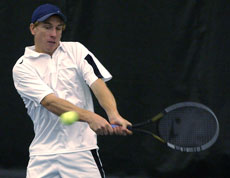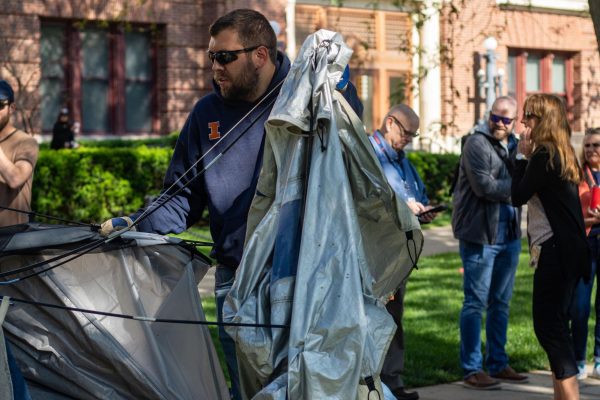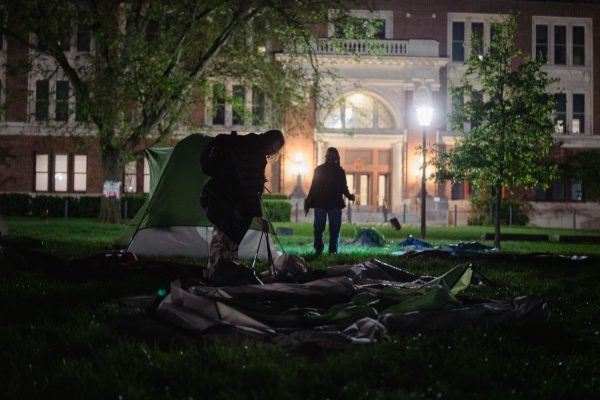Illini to revitalize tennis overseas

Online Poster
March 15, 2005
GD Jones has a daunting task in front of him – to help revitalize New Zealand tennis.
However, if his recent Davis Cup performance is any indication of whether he will be able to accomplish that task, there is no doubt he will succeed.
New Zealand Davis Cup non-playing captain Bruce Derlin named Jones, a sophomore on the Illinois men’s tennis team, to the New Zealand Davis Cup squad in late February. On March 4, Jones played – and won – his first Davis Cup match against Kazakhstan’s Alexey Kedriouk, but the 18-year-old said he feels no additional pressure when exchanging Illinois’ orange and blue for New Zealand’s black and white to represent his native country. Instead, he said, “It was a great honor.”
“It was something that I have always dreamed of doing, and I was really proud to play,” Jones said. “I got a little bit of a chill.”
However, Jones was not only representing his country, he was playing for New Zealand in New Zealand. His entire family, which rarely gets to see him play, attended. The entire crowd, and country, was supporting him, as well when he graced the indoor tennis courts in North Harbour.
Get The Daily Illini in your inbox!
“It’s not only an honor, but it’s a very exciting thing to do,” said Illinois head coach Craig Tiley, who was the captain of the South African Davis Cup team from 1998-2001. “He receives national colors and national recognition. For him to go and perform and do what he did – and win two matches – was a great start to his Davis Cup career.”
It was a start that could have been much different.
Jones was expected to have a tough first-round opponent – Kedriouk is ranked at about No. 420 in the world. Jones was No. 33 in the Intercollegiate Tennis Association’s March 8 rankings. Still, the sophomore was “quietly confident” before the match and believed he could succeed.
“Rankings are a fairly good indicator, but I knew I could compete at that level,” Jones said. “I’ve beaten guys at that level before.”
Tiley said he believed the young Illini would be successful in his first Davis Cup competition because of his success at the collegiate level and the improvements Jones has made since arriving at Illinois in January 2004.
Davis Cup play pits two teams from different countries against each other for a weekend-long, best-of-five-matches competition. Two singles matches are held on the opening and closing day of the event. A doubles match is played in between. Jones competed in one singles match on each day, receiving a standing ovation from the crowd after winning his matches.
“He is going to be a consistent performer for New Zealand and one of their better ones in the future,” Tiley said. “He’s really growing in leaps and bounds. He’s still got a long way to go, but he knows it, and he’s working hard on getting there.”
But for now, Jones has more immediate concerns on his mind.
It is March’s, and the NCAA Championships are quickly approaching for Jones and the other members of the Illinois team.
When Jones left for the international competition, despite Tiley’s blessing, he felt torn. His teammates took on Penn State, Purdue and Indiana in his absence, and he said leaving his team was very hard, especially when the Illini narrowly escaped from the match against Indiana with a 4-3 victory over the Hoosiers.
“I’m glad they got through the matches that they did and played OK,” Jones said. “I would have felt really bad if that wasn’t the case.”
However, having competed in the team structure of collegiate tennis might have worked to Jones’ benefit throughout the Davis Cup matches.
Many professional athletes, from whom the Davis Cup captains often pick their rosters, usually travel and compete without other athletes. These men might not be used to competing in a team environment where there is not only the desire to play well to secure a victory for yourself, but also the additional pressure of having to perform well for your teammates.
“I felt that he would have been a leader for that team because he has been on the college team and understands what it takes to operate in a team environment,” Tiley said. “To win your matches at the beginning of your Davis Cup experience is fantastic, and he’ll be able to build on that in future ties.”
Jones sees his Davis Cup future progressing much the same way – in a vertical line that has no limits. But with that success, he also sees increasing responsibility.
“As I get better, I have to help the team to improve; and we’ve got to climb the ranks over the next four or five years,” said Jones, who would like to be a role model for younger athletes in New Zealand. “Tennis is extremely popular (in New Zealand), but it’s not played with a lot of success at the elite level and that is a shame. I think what has been lacking over the last 10 or so years is one player who can be something of a role model for younger players in New Zealand.”
Jones has already taken the first steps to becoming a role model and propelling the level of tennis in New Zealand by sweeping through his first two Davis Cup matches. After defeating Kedriouk in straight sets on March 4, he topped Kazakhstan’s Stanislav Buykov also in straight sets in his last match of the tie.
But, Jones will not rest on his laurels after achieving international recognition and jumpstarting his professional and Davis Cup career – there is still much to be accomplished before New Zealand’s mid-July Davis Cup match against Kuwait in New Zealand.
As of last week, Jones was still adjusting to the time zone changes – it takes 25 hours to travel from New Zealand, forcing Jones to lose a whole day when returning from Auckland, his hometown. He is also awaiting the upcoming matches against Stanford later this month and Ohio State in April, followed by the NCAA tournament. Those tournament matches include possible clashes against UCLA, Baylor, Georgia and Virginia.
“Myself, personally, I feel extremely prepared (for the rest of the collegiate season),” Jones said. “And, as a team, I think we’re just getting better every day. Hopefully, come the end of May, we’ll be ready to win a national championship.”






